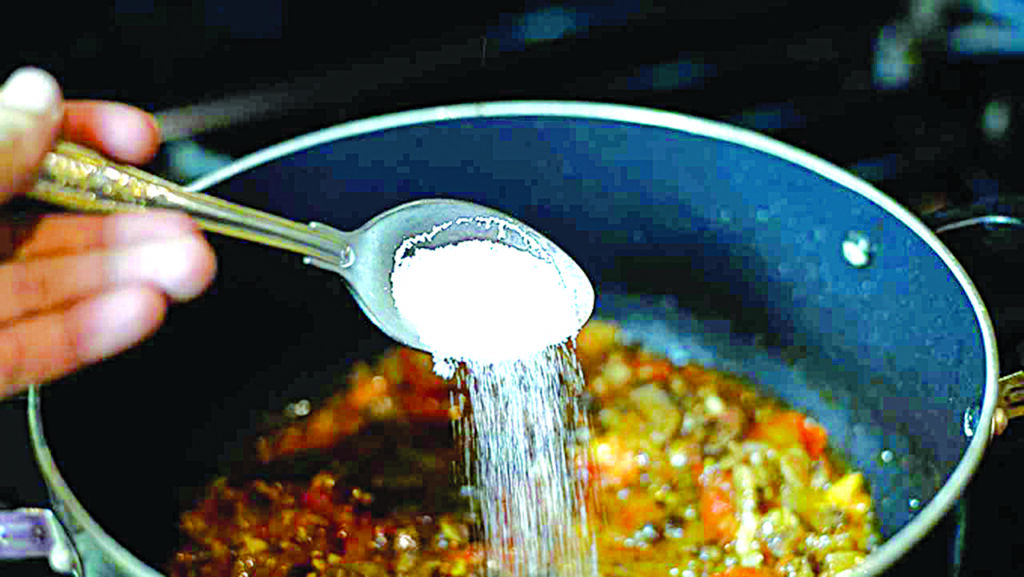
The federal government has expressed worry over the high salt intake by Nigerians, lamenting that Nigerians consume between 5.8 to 25 grams of dietary salt per day, significantly higher than the World Health Organisation’s (WHO) recommended maximum daily intake of 2 grams of sodium and 5 grams of salt.
The FG noted that reducing sodium intake is crucial for controlling blood pressure, which can prevent hypertension and reduce the risk of cardiovascular diseases.
Meanwhile, the WHO has urged countries to adopt the global sodium benchmarks to reduce their populations’ sodium intake.
The UN body also called on the industry to implement the global sodium benchmarks and reformulate food products to contain less salt/sodium.
Speaking at the briefing heralding the 2024 Salt Awareness Week yesterday in Abuja, Coordinating Minister of Health and Social Welfare, Prof Muhammad Ali Pate, observed that salt has a far-reaching impact as the high salt intake contributes significantly to elevated blood pressure, a precursor to heart attacks and strokes.
Quoting the WHO 2019 report, Pate disclosed about 17.9 million lives are lost annually to cardiovascular events.
He said, ‘By reducing salt consumption, we can rewrite the narrative, sparing countless lives from premature loss. There are varying estimates of the average daily intake of dietary sodium among Nigerian adults, ranging from 2.3 to 10 grams per day, while the intake of dietary salt ranges from 5.8 to 25 grams per day. This is significantly higher than the World Health Organization’s recommended maximum daily intake of 2 grams of sodium and 5 grams of salt.
Represented by the Permanent Secretary in the ministry, Daju Kachollom, the minister noted that Nigeria, is not immune to the global epidemic of hypertension and heart diseases, stressing that the choices we make at our dining tables, the ingredients we stir into our pots, and the snacks we consume in moments of leisure – all contribute to the silent escalation of health risks associated with high salt intake
According to him, reducing sodium intake is crucial for controlling blood pressure, which can prevent hypertension and reduce the risk of cardiovascular diseases.
He said, ‘The burden of excess sodium consumption in Nigeria is significant, with 10% of cardiovascular disease deaths attributed to it. Implementing sodium reduction strategies can lead to significant healthcare savings by preventing costly medical treatments for diseases caused by high sodium intake. Our lifestyle Choices such as the consumption of certain culinary delights often come with a hidden cost. Salt, when overused, exacts its toll.
“In our quest for a healthier Nigeria, we have embarked on several pivotal initiatives that are worth highlighting today. These efforts are not just plans on paper; they are commitments etched in the very fabric of our national health policy. National Multi-sectoral Action Plan (NMSAP) for the Prevention and Control of Non-Communicable Diseases 2019. This plan, aligned with the World Health Organization’s SHAKE package, is a testament to our dedication to combating the silent epidemic of non-communicable diseases through strategic policy intervention.
“We have revised the National Policy on Food Safety & Quality and its Implementation Plan for 2023. This revision includes a crucial
emphasis on healthy diets and underscores the importance of developing a National Guideline for Sodium Reduction. Inauguration of the National Technical Working Group on Sodium Reduction. Together, they are developing the first National Guideline on Sodium Reduction. This groundbreaking work is expected to reach completion in the 3rd Quarter of 2024. We have initiated the development of the 1st National Sodium Benchmark. This involves drafting mandatory sodium targets for selected food categories, a step that will pave the way for scientific and measurable progress in our fight against excessive salt consumption.”
Also speaking, WHO Country Representative, Dr Walter Mulombo, explained that WHO recommends consuming less than 5 grams of salt per day for adults daily from all sources, which is less than a teaspoonful adding that the global average intake of sodium is more than double.
He noted that excessive salt consumption is linked to non-communicable diseases like high blood pressure, cardiovascular diseases, gastric cancer and kidney disease.
Mulombo stated that excessive consumption of salt/sodium adversely affects blood pressure is irrefutable stressing that World Salt Awareness Week aims to encourage the implementation of evidence-based interventions to reduce salt consumption in the population to protect cardiovascular health and help prevent many other diseases.
He said, ‘This year’s theme is “It’s time to shine the spotlight on salt,” highlighting the issue of the “hidden” salt (sodium) in many processed and ultra-processed products. In many countries, three-quarters of sodium in the diet comes from ultra-processed and processed foods, such as bread, sauces and dressings, crackers and cookies, ready-to-eat meals, processed meats, and cheeses.”
Mulombo said that emphasis on healthy diets underscores the importance of developing a National Guideline for Sodium Reduction.
In her remarks, the Director-General of the National Agency for Food and Drug Administration and Control (NAFDAC), Prof Mojisola Adeyeye, observed excessive intake of sodium is linked to various health problems, particularly hypertension, which is a major risk factor for cardiovascular diseases adding that in Nigeria, hypertension is a leading cause of morbidity and mortality, and high salt consumption is a significant contributing factor.
“High blood pressure is the main cause of strokes and a major cause of heart attacks, the two biggest causes of death around the world, responsible for 17.9 million deaths annually (according to 2019 statistics, WHO). The World Health Organisation (WHO) recommends that adults consume less than 2g/day of sodium (equivalent to less than 5 g/day salt, which is just under a teaspoon. For children 2- 15 years, a downward adjustment is also recommended.
“Regardless of our age or gender, we all stand to benefit from reducing our salt intake. The earlier we adapt to a lower salt diet, the less damage we create for our hearts, but with blood pressure in children rising, it is clear that salt is not just an issue for the older generation'” she added.
One of the partners, Resolve to Save Lives stressed the need to minimise the consumption of sodium in our diets across Nigeria adding that the event is a major step in sensitising the citizens to the dangers of high levels of salt and informed choice over what food to eat.













